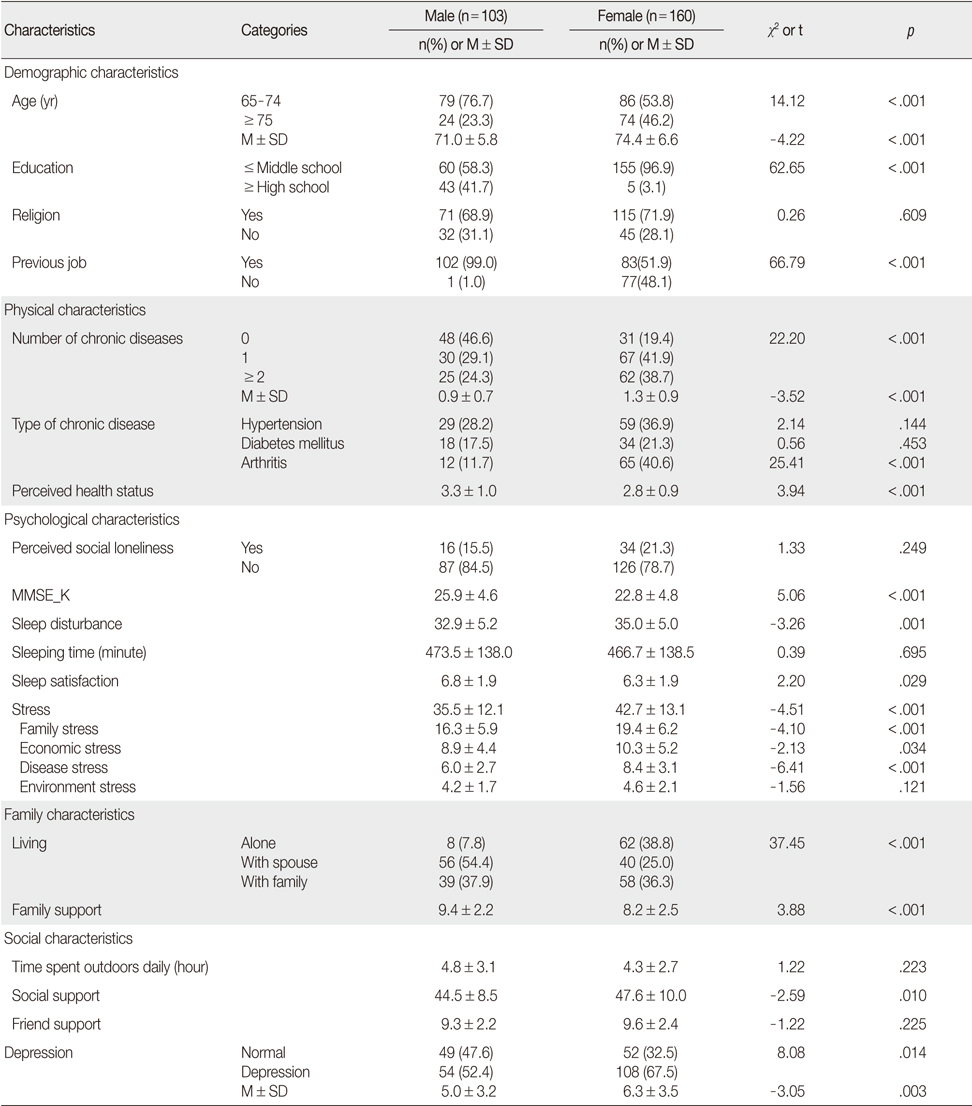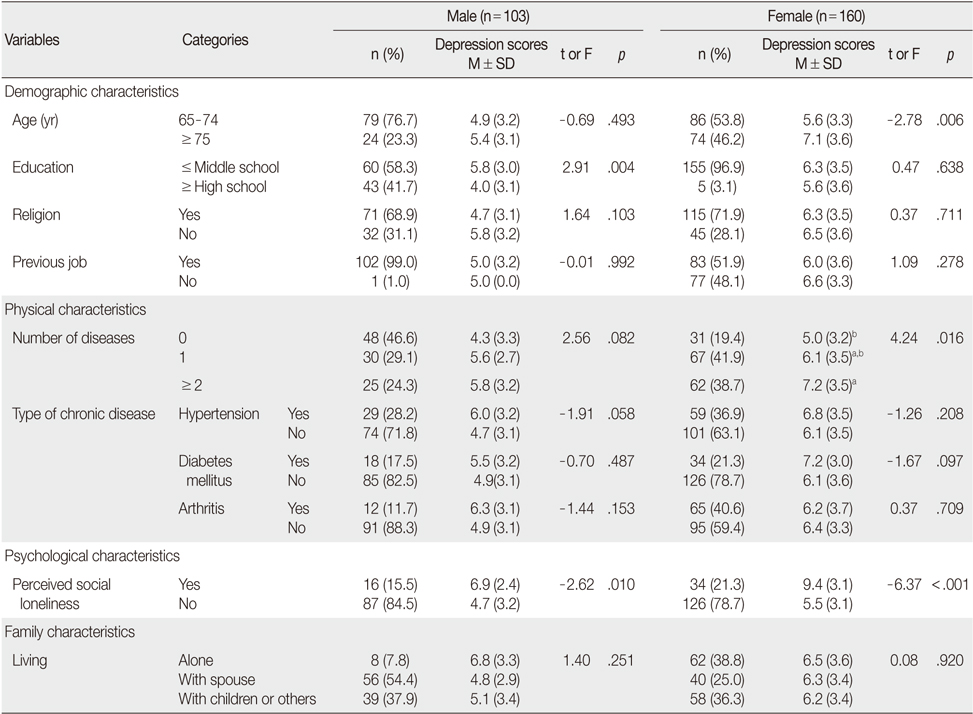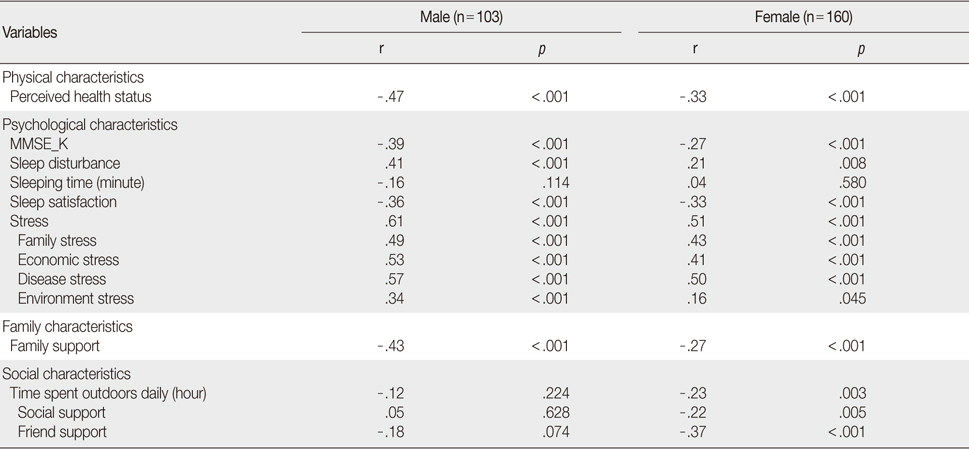Articles
- Page Path
- HOME > J Korean Acad Nurs > Volume 42(1); 2012 > Article
-
Original Article
- Gender Difference in Risk Factors for Depression in Community-dwelling Elders
- Chul-Gyu Kim, Seungmi Park
-
Journal of Korean Academy of Nursing 2012;42(1):136-147.
DOI: https://doi.org/10.4040/jkan.2012.42.1.136
Published online: February 29, 2012
1Full-time lecturer, Department of Nursing, Cheongju University, Cheongju, Korea.
2Assistant professor, Department of Nursing, Hoseo University, Asan, Korea.
- Address reprint requests to: Park, Seungmi. Department of Nursing, Hoseo University, 146 Sechul-ri, Baebang-eup, Asan 336-795, Korea. Tel: +82-41-540-9533, Fax: +82-41-540-9558, seungmipark@hoseo.edu
© 2012 Korean Society of Nursing Science
- 1,219 Views
- 3 Download
- 19 Crossref
Abstract
-
Purpose
- This study was conducted to compare the degree of depression between men and women and to identify factors influencing their depression.
-
Methods
- Participants in this cross-sectional descriptive study were 263 persons over 65 years old (men: 103, women: 160). Data were collected through face to face interviews using questionnaires and were done in two urban areas in 2010. Research instruments utilized in this study were SGDS, MMSE-K, SRH, FILE, sleep pattern scale, family and friend support scale, and social support scale. Multivariate regression analysis was performed to identify factors influencing depression in elders.
-
Results
- The proportions of participants with depression were significantly different between men and women (52.4% vs. 67.5%). Regression model for depression in elderly men significantly accounted for 54%; disease stress (32%), economic stress (10%), perceived health status (4%), and family support, educational level, age, and hypertension. Regression model for depression in elderly women significantly accounted for 47%; disease stress (25%), perceived social loneliness (8%), friend support (5%), family stress (4%), and sleep satisfaction, and family support.
-
Conclusion
- Results demonstrate that depression is an important health problem for elders, and show gender differences for factors influencing depression. These results could be used in the developing depression prevention programs.
- 1. Adams K.B., Sanders S., Auth E.A. Loneliness and depression in independent living retirement communities: Risk and resilience factors. Aging and Mental Health. 2004;8:475–485. http://dx.doi.org/10.1080/13607860410001725054.ArticlePubMed
- 2. Back J.H., Lee Y. Gender differences in the association between socioeconomic status (SES) and depressive symptoms in older adults. Archives of Gerontology and Geriatrics. 2011;52:e140–e144. http://dx.doi.org/10.1016/j.archger.2010.09.012.ArticlePubMed
- 3. Cole M.G., Dendukuri N. Risk factors for depression among elderly community subjects: A systematic review and meta-analysis. American Journal of Psychiatry. 2003;160:1147–1156.ArticlePubMed
- 4. Han I.Y., Chung S.D. Linkage effects of new social support system for the elderly women living alone. Journal of the Korea Gerontological Society. 2002;21(3):145–156.
- 5. Huang C.Q., Dong B.R., Lu Z.C., Yue J.R., Liu Q.X. Chronic diseases and risk for depression in old age: A meta-analysis of published literature. Ageing Research Reviews. 2010;9(2):131–141. http://dx.doi.org/10.1016/j.arr.2009.05.005.ArticlePubMed
- 6. Chang-Quan H., Xue-Mei Z., Bi-Rong D., Zhen-Chan L., Ji-Rong Y., Qing-Xiu L. Health status and risk for depression among the elderly: A meta-analysis of published literature. Age Ageing. 2010;39:23–30. http://dx.doi.org/10.1093/ageing/afp187.ArticlePubMed
- 7. Jung Y.M. Health status and associated factors of depression according to depression in elderly women. Journal of the Korean Gerontological Society. 2007;27(1):71–86.
- 8. Jung Y.M., Kim J.H. Comparison of cognitive levels, nutritional status, depression in the elderly according to living situations. Journal of Korean Academy of Nursing. 2004;34:495–503.ArticlePubMedPDF
- 9. Kaneko Y., Motohashi Y., Sasaki H., Yamaji M. Prevalence of depressive symptoms and related risk factors for depressive symptoms among elderly persons living in a rural Japanese community: A cross-sectional study. Community Mental Health Journal. 2007;43:583–590. http://dx.doi.org/10.1007/s10597-007-9096-5.ArticlePubMedPDF
- 10. Korea Centers for Disease Control & Prevention. Risk factors for depression in older Koreans: Community-based geriatric cohort study, 2006-2007. Public Health Weekly Report. 2009;2:737–741.
- 11. Kim C.G. The relationship of family support, health perception, nutritional status and depression in elders. Journal of Korean Gerontological Nursing. 2007;9:14–21.
- 12. Kim D.B., Sohn E.S. A meta-analysis of the variables related to depression in elderly. Journal of the Korean Gerontological Society. 2005;25(4):167–187.
- 13. Kim K.J., Pyo K.S. An exploration of the arousing factors and the relaxing factors on depression among the old people. Journal of Welfare for the Aged. 2008;39:111–143.
- 14. Kwon Y.C., Park J.H. Korean version of mini-mental state examination (MMSE-K), Part I: Development of the test for the elderly. Journal of Korean Neuropsychiatric Association. 1989;28:125–135.
- 15. Lee H.S., Kim H.S., Jung Y.M. Depression and quality of life in Korean elders. Journal of Korean Academy of Community Health Nursing. 2009;20:12–22.
- 16. Lee I.J. Sex differences in the effects of psychosocial factors on depression and life satisfaction of older persons. Journal of Welfare for the Aged. 2007;36:159–179.
- 17. Lee K.J., Park H.S. A study on the perceived health status, depression, and activities of daily living for the elderly in urban areas. Journal of Korean Academy of Women's Health Nursing. 2006;12:221–230.ArticlePDF
- 18. Lee P.S., Lee Y.M., Lim J.Y., Hwang R.I., Park E.Y. The relationship of stress, social support and depression in the elderly. Journal of Korean Academy of Nursing. 2004;34:477–484.ArticlePubMedPDF
- 19. Lee S.S., Lee K.J. The stress, social support and psychological well-being of the elderly. Journal of the Korea Gerontological Society. 2002;22(1):1–20.
- 20. Lee S.Y. The effects of health behavior-related characteristics, self-esteem, activities of daily living, and family support on depression in the community-dwelling elderly. Journal of Korean Academy of Community Health Nursing. 2010;21:489–501.Article
- 21. Lee Y.J., Kim T.H. A study on the buffering effect of social support on the stress of the elderly who lives alone. Journal of the Korea Gerontological Society. 1999;19(3):79–93.
- 22. Lynch S.A. Who supports whom? How age and gender affect the perceived quality of support from family and friends. Gerontologist. 1998;38:231–238.ArticlePubMed
- 23. Moon M.J. Factors influencing depression in elderly people living at home. Journal of Korean Academy of Nursing. 2010;40:542–550. http://dx.doi.org/10.4040/jkan.2010.40.4.542.ArticlePubMed
- 24. Depressed patients in elderly increasing continuously. National Health Insurance Corporation. 2009;06 24 Retrieved January 26, 2011. http://www.nhic.or.kr/portal/site/main/menuitem.31f14893bf4f6c38b31148b4062310a0/.
- 25. Medical cost of elderly in the first half of 2010. National Health Insurance Corporation. 2010;11 08 Retrieved January 26, 2011. from http://www.nhic.or.kr/portal/site/main/menuitem.31f14893bf4f6c38b31148b4062310a0/.
- 26. Oh J.J., Song M.S., Kim S.M. Development and validation of Korean sleep scale A. Journal of Korean Academy of Nursing. 1998;28:563–572.
- 27. Oh K.O., Sung E.O., Gang M.H. Influencing factors on depression in elderly residing in the community. Journal of Korean Academy of Psychiatric and Mental Health Nursing. 2006;15:459–466.
- 28. Park Y.H., Kang H.S. Factors associated with social isolation in older adults using senior welfare centers. Journal of Korean Academy of Nursing. 2008;38:712–719. http://dx.doi.org/10.4040/jkan.2008.38.5.712.ArticlePubMed
- 29. Song M.S. Construction of a functional status prediction model for the elderly. 1991;Seoul, Seoul National University. Unpublished doctoral dissertation.
- 30. The Korean Geriatrics Society. Textbook of geriatric medicine. 2005;2nd ed. Seoul, Medical Publishing.
REFERENCES
Figure & Data
REFERENCES
Citations

- Effect of Life Satisfaction on Depression among Childless Married Couples: A Cross-Sectional Study
Ju-Young Ha, Hyo-Jin Park
International Journal of Environmental Research and Public Health.2022; 19(4): 2055. CrossRef - Effectiveness of Social Support for Community-Dwelling Elderly with Depression: A Systematic Review and Meta-Analysis
Seon Heui Lee, Hanju Lee, Soyoung Yu
Healthcare.2022; 10(9): 1598. CrossRef - Sex Differences in Factors Affecting Depressive Symptoms in Older People in the Prefrailty Phase
Eun Ju Lim
International Journal of Environmental Research and Public Health.2020; 17(12): 4207. CrossRef - Factors Influencing Depression: Comparison according to Economic Status
Myoungjin Kwon, Kawoun Seo
Journal of Korean Academy of Fundamentals of Nursing.2020; 27(3): 226. CrossRef - Effects of a Customized Health Promotion Program on Depression, Cognitive Functioning, and Physical Health of Elderly Women Living Alone in Community: A Cluster Randomized Controlled Trial
Ye Ri Ja Park, Kyeong-Yae Sohng
Journal of Korean Academy of Nursing.2019; 49(5): 515. CrossRef - Factors Influencing Depression in Middle Aged Women: Focused on Quality of life on Menopause
Jung Nam Sohn
Journal of Health Informatics and Statistics.2018; 43(2): 148. CrossRef - The Effect of Vitamin D and Calcium on Cognitive Function and Depression in the Elderly Living in a City
Yu-Jin Lee, Yun-Su Kim
Journal of Korean Academy of Community Health Nursing.2017; 28(3): 251. CrossRef - The Effect of Widowhood on Parent–Child Relationships in Korea: Do Parents’ Filial Expectations and Geographic Proximity to Children Matter?
Jung-Hwa Ha, Hyunsook Yoon, Yeon Ok Lim, Sun-Young Heo
Journal of Cross-Cultural Gerontology.2016; 31(1): 73. CrossRef - Depression and Cognitive Function of the Community-dwelling Elderly
Seong Ok Seo, Ae Young So
Journal of Korean Academy of Community Health Nursing.2016; 27(1): 1. CrossRef - Associations of various perceived-stress situations with depressive symptoms in ≥50-year old Taiwanese men and women: Results from the Taiwan Longitudinal Study on Aging
Hsin-Jen Tsai, Fu-Kuei Chang
Archives of Gerontology and Geriatrics.2016; 67: 113. CrossRef - Experiences of Depression in Low Income Elderly Women
Jeung-Im Kim, Haeng-Mi Son
Korean Journal of Women Health Nursing.2016; 22(4): 241. CrossRef - The Factors Associated with Depression in the Elderly Male: Based on the 5th Korea National Health and Nutrition Examination Survey
Doonam Oh, Chul-Gyu Kim
Korean Journal of Adult Nursing.2015; 27(5): 583. CrossRef - Factors Influencing Depression in low-income Elderly living at home based on ICF model
Suk Jung Han, Hyo Sun Kim
Journal of Korean Public Health Nursing.2014; 28(2): 333. CrossRef - Depression and suicidal ideation in community-dwelling older adults in Korea
So-Hi Kwon, Myungji Sohn
Journal of the Korean Data and Information Science Society.2014; 25(3): 655. CrossRef - The Effect of Depression and Suicide Prevention Program for Vulnerable Community-Dwelling Elderly Women
Jae-Soon Yoo, Hyun-Sook Kim, Hyon-Jin Yon
Journal of the Korea Academia-Industrial cooperation Society.2014; 15(5): 2882. CrossRef - Estudo longitudinal dos fatores associados à evolução de sintomas depressivos em idosos institucionalizados
Filomena Vicente, Helena Espirito-Santo, Diana Cardoso, Fabiana da Silva, Marina Costa, Sónia Martins, Inês Torres-Pena, Vera Pascoal, Fátima Rodrigues, Ana Pinto, Sara Moitinho, Sónia Guadalupe, Henrique Testa Vicente, Laura Lemos
Jornal Brasileiro de Psiquiatria.2014; 63(4): 308. CrossRef - Gender Difference in Factors Related to Depression in Vulnerable Elderly
Eun-Kyung Kim
The Korean Journal of Health Service Management.2014; 8(3): 169. CrossRef - Effects of Laughter Therapy on Depression in elderly
Mi Young Chang
Journal of Digital Convergence.2014; 12(6): 501. CrossRef - Factors Influencing Depressive Symptoms in Community Dwelling Older People
Jung Nam Sohn
Journal of Korean Academy of Psychiatric and Mental Health Nursing.2013; 22(2): 107. CrossRef
General Characteristics, Health-related Factors and Depression according to Gender
MMSE_K=Korean mini-mental state examination.
Comparison of Depression Scores according to Participant Characteristics
a, bDuncan grouping.
Correlation of Participant Characteristics to Depression Scores
MMSE_K=Korean mini-mental state examination.
Factors Influencing Depression in Elderly Men (N=103)
Factors Influencing Depression in Elderly Women (N=160)
MMSE_K=Korean mini-mental state examination.
a, bDuncan grouping.
MMSE_K=Korean mini-mental state examination.
 KSNS
KSNS
 E-SUBMISSION
E-SUBMISSION





 Cite
Cite

